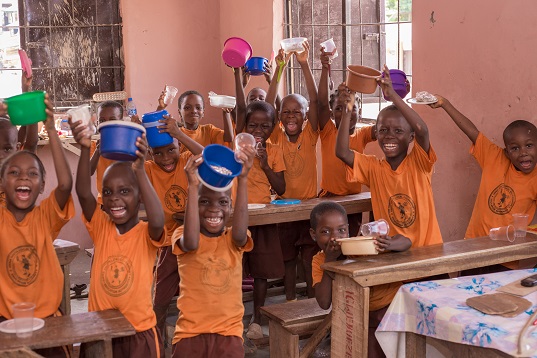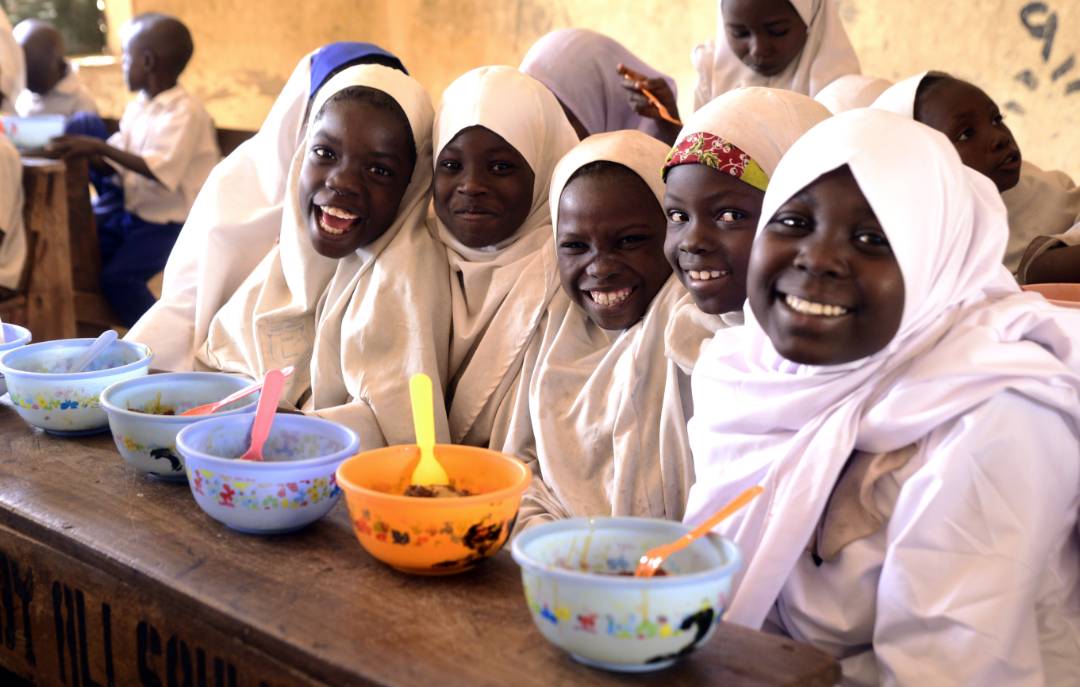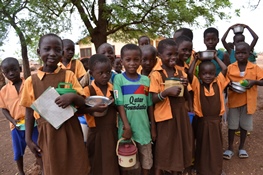Last Updated on Tuesday, 13 December 2016 10:55
 A Home Grown School Feeding (HGSF) programme was been launched in Anambra State as part of a national school feeding programme designed to improve the health and education of children whilst at the same time providing employment and raising agricultural incomes.
A Home Grown School Feeding (HGSF) programme was been launched in Anambra State as part of a national school feeding programme designed to improve the health and education of children whilst at the same time providing employment and raising agricultural incomes.With the backing of Federal and State governments the HGSF programme in Anambra Sate will provide an estimated 77,000 pupils from primary 1-3 in 1050 schools a free nutritious school meal every school day. The programme has been supported by a N53, 687, 900 grant from the federal government to enable 774 school caterers to prepare meals using food procured from local smallholder farmers.
The HGSF programme - a core component of President Burhari's Social Investment Plans- has been described as a 'win-win-win' for the communities who are engaged with the programme. School children benefit from free nutritionally balanced hot meals; local agricultural economies benefit from being able to supply the schools with the ingredients used in the meals; and local communities benefit from the employment opportunities provided by the programme.
Speaking from Awka, Anambra State capital on the programme's launch day on 8th December 2016, the Special Assistant on Home Grown School Feeding Programme in the Office of the Vice President, Mr. Dotun Adebayo said primary school pupils in Anambra were excited as the feeding started in their schools.
Adebayo led a team of Federal and State officials to some of the schools on day one of the HGSF Programme implementation said they witnessed the feeding in three schools in Akwa: Community Primary School, Awka South, Central School Ameobi, and Central School in Nibo.
"The pupils were excited and enjoyed a meal of 'Okpa' or Moin-Moin garnished with vegtables. The meals were prepared by some of the 774 cooks who have been recruited and trained as part of the HGSF programme. "
The Anambra HGSF programme is part of a wider national programme which is being trialled in 18 Nigerian States in 2016.
The Federal Government's national school feeding strategy, launched in June 2016, highlighted the Government's commitment to support effective state level programmes where States meet the federal requirements for such engagement. Under the school feeding programme, there are no pre-selections, but states/FCT have to meet the stipulated requirements.
To-date a total of 17 States have concluded the designing of their HGSF models through state-level multi-sectorial capacity building workshops. The 17 states are Anambra, Akwa Ibom, Ebonyi, Enugu, Sokoto, Kaduna, Borno, Zamfara, Ogun, Oyo, Osun, Benue, Plateau, Taraba, Delta, Abia and Bauchi. Estimated figures from 15 of these states put the numbers of pupils to be feed at over 3.4 million.
As part of this programme the HGSF programme team, which is being coordinated with technical assistance from the Partnership for Child Development at Imperial College London, has successfully conducted food safety and hygiene training for over 25,000 cooks in 9 states (out of the 17).
The programme will be scaled-up nationally in 2017 to enable all 36 states and FCT to participate.

 On the 1st March, the continent of Africa joins together to mark the Africa Day of School Feeding. A day when countries celebrate and acknowledge the impact that providing a school meal can have on the health, education and wealth of communities up and down the continent.
On the 1st March, the continent of Africa joins together to mark the Africa Day of School Feeding. A day when countries celebrate and acknowledge the impact that providing a school meal can have on the health, education and wealth of communities up and down the continent.



 Preliminary findings of a 3 year impact evaluation of the nutritional and agricultural benefits of the Ghana School Feeding Programme indicate that the Home Grown School Feeding (HGSF) programme in Ghana can improve educational opportunities for children especially girls and also increase agricultural incomes for smallholder farmers.
Preliminary findings of a 3 year impact evaluation of the nutritional and agricultural benefits of the Ghana School Feeding Programme indicate that the Home Grown School Feeding (HGSF) programme in Ghana can improve educational opportunities for children especially girls and also increase agricultural incomes for smallholder farmers.  The Government of Ghana has launched its national School Feeding Policy as part of its efforts to eradicate extreme poverty and hunger and achieve universal primary education.
The Government of Ghana has launched its national School Feeding Policy as part of its efforts to eradicate extreme poverty and hunger and achieve universal primary education.